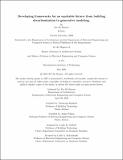| dc.contributor.advisor | Reinhart, Christoph | |
| dc.contributor.advisor | Wilson, Ashia | |
| dc.contributor.author | De Simone, Zoe | |
| dc.date.accessioned | 2024-10-16T17:44:46Z | |
| dc.date.available | 2024-10-16T17:44:46Z | |
| dc.date.issued | 2024-05 | |
| dc.date.submitted | 2024-10-10T15:16:57.909Z | |
| dc.identifier.uri | https://hdl.handle.net/1721.1/157353 | |
| dc.description.abstract | In this thesis I develop computational frameworks to understand equity under two perspectives: building decarbonization policy and generative modeling.
Part 1 - Equitable building decarbonization
Buildings significantly contribute to global carbon emissions, necessitating urgent decarbonization to meet 2050 climate targets. The U.S. strives for net-zero emissions by 2050, supported by federal incentives promoting building upgrades. However, financing deep retrofits for all U.S. homes exceeds available public funds. This chapter proposes a model that examines long-term carbon reduction trajectories under various incentive policies, focusing on fairness and equity. Using Oshkosh, WI, as a case study, it explores the philosophical, economic, political, and mathematical dimensions of creating just and effective decarbonization policies that ensure healthy, low-carbon homes for all.
Part 2 - Equitable diffusion models
Generative Text-to-Image (TTI) models, while capable of producing high-quality images, often replicate training data biases. Traditional fairness views in machine learning, which consider fairness as binary, are challenged. This section introduces DiffusionWorldViewer, a novel framework with a Web UI that enables users to analyze the underlying worldviews of diffusion models and edit model outputs to align with their personal fairness perspectives, thus promoting a diverse understanding of fairness in AI technologies. | |
| dc.publisher | Massachusetts Institute of Technology | |
| dc.rights | In Copyright - Educational Use Permitted | |
| dc.rights | Copyright retained by author(s) | |
| dc.rights.uri | https://rightsstatements.org/page/InC-EDU/1.0/ | |
| dc.title | Developing frameworks for an equitable future: from building decarbonization to generative modeling. | |
| dc.type | Thesis | |
| dc.description.degree | S.M. | |
| dc.description.degree | S.M. | |
| dc.contributor.department | Massachusetts Institute of Technology. Department of Electrical Engineering and Computer Science | |
| dc.contributor.department | Massachusetts Institute of Technology. Department of Architecture | |
| dc.identifier.orcid | https://orcid.org/0000-0001-9138-9362 | |
| mit.thesis.degree | Master | |
| thesis.degree.name | Master of Science in Electrical Engineering and Computer Science | |
| thesis.degree.name | Master of Science in Architecture Studies | |
